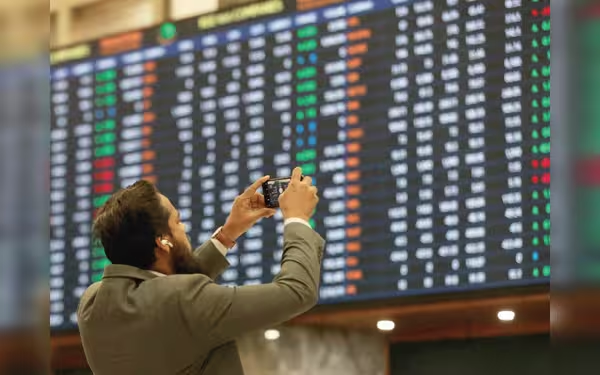Saturday, November 16, 2024 05:49 PM
PSX Declines Due to IMF Conditions and Political Uncertainty
- PSX faces decline amid tough IMF conditions.
- Political instability affects investor confidence.
- Privatization delays hinder foreign investment.
 Image Credits: tribune.com.pk
Image Credits: tribune.com.pkThe PSX declines due to tough IMF conditions and political uncertainty, impacting investor confidence and delaying privatization efforts.
The Pakistan Stock Exchange (PSX) has recently experienced a significant decline, primarily driven by challenging conditions set forth by the International Monetary Fund (IMF). Investors are feeling the heat as the political landscape remains tumultuous, and the anticipated privatization of state-owned enterprises (SOEs) continues to face delays. This situation has created a ripple effect, particularly impacting heavyweight sectors such as banking and cement, which are crucial to the country's economic framework.
In the past few trading sessions, there has been notable selling pressure in these sectors. Analysts suggest that this trend can largely be attributed to foreign corporates offloading their shares, which has further dampened investor sentiment. The uncertainty surrounding the political environment, coupled with the stringent conditions imposed by the IMF, has left many investors wary. They are understandably cautious about making new investments in a market that seems to be in a state of flux.
Moreover, the delay in the privatization of SOEs has raised concerns among market participants. Privatization is often seen as a pathway to enhance efficiency and attract foreign investment. However, the ongoing political noise has stalled these efforts, leading to a lack of confidence among investors. As a result, many are opting to hold back on their investments, waiting for clearer signals from the government regarding economic reforms and privatization plans.
The current state of the PSX reflects a broader narrative of uncertainty and caution among investors. The interplay between political developments and economic policies will be crucial in determining the market's trajectory in the coming weeks. For investors, staying informed and adaptable is key in navigating these challenging times. As the situation evolves, it will be essential to keep a close eye on both local and international developments that could impact market dynamics.













